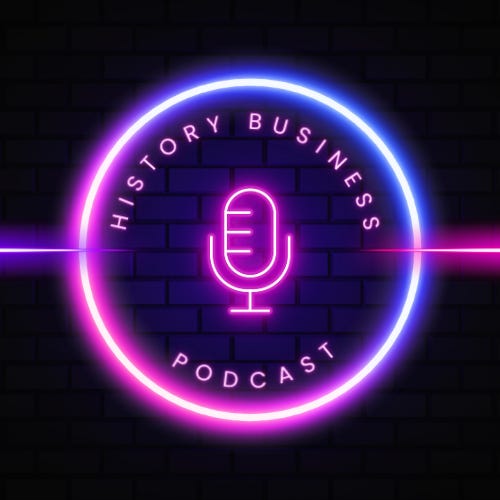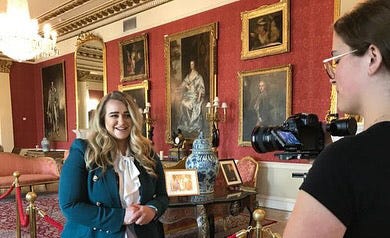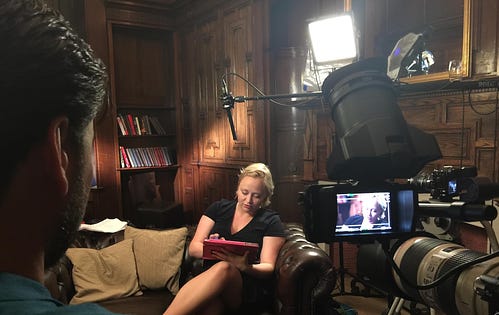From: How-to History <howtohistory@substack.com>
Sent: 21 February 2024 07:00
To: icnewsletters48@gmail.com
Subject: Be a Freelance Historian
The World
͏ ͏ ͏ ͏ ͏ ͏ ͏ ͏ ͏ ͏ ͏ ͏ ͏ ͏ ͏ ͏ ͏ ͏ ͏ ͏ ͏ ͏ ͏ ͏ ͏ ͏ ͏ ͏ ͏ ͏ ͏ ͏ ͏ ͏ ͏ ͏ ͏ ͏ ͏ ͏ ͏ ͏ ͏ ͏ ͏ ͏ ͏ ͏ ͏ ͏ ͏ ͏ ͏ ͏ ͏ ͏ ͏ ͏ ͏ ͏ ͏ ͏ ͏ ͏ ͏ ͏ ͏ ͏ ͏ ͏ ͏ ͏ ͏ ͏ ͏ ͏ ͏ ͏ ͏ ͏ ͏ ͏ ͏ ͏ ͏ ͏ ͏ ͏ ͏ ͏ ͏ ͏ ͏ ͏ ͏ ͏ ͏ ͏ ͏ ͏ ͏ ͏ ͏ ͏ ͏ ͏ ͏ ͏ ͏ ͏ ͏ ͏ ͏ ͏ ͏ ͏ ͏ ͏ ͏ ͏ ͏ ͏ ͏ ͏ ͏ ͏ ͏ ͏ ͏ ͏ ͏ ͏ ͏ ͏ ͏ ͏ ͏ ͏ ͏ ͏ ͏ ͏ ͏ ͏ ͏ ͏ ͏ ͏ ͏ ͏ ͏ ͏ ͏ ͏ ͏ ͏ ͏ ͏ ͏ ͏ ͏ ͏ ͏ ͏ ͏ ͏ ͏ ͏ ͏ ͏ ͏ ͏ ͏ ͏ ͏ ͏ ͏ ͏ ͏ ͏ ͏ ͏ ͏ ͏ ͏ ͏ ͏ ͏ ͏ ͏ ͏ ͏ ͏ ͏ ͏ ͏ ͏ ͏ ͏ ͏
In 2023, Laura Fitzachary and I set up our podcast History Business: A guide to being a historian for hire knowing that we wanted to talk to people working not only in different areas of the industry but also people with different levels of experience. Over the last two seasons of the show, we learnt so much about the business– both good and bad from our wonderful guests. Therefore, rather than just a general summary of how to be a freelance historian I thought it would be more useful to let the experts do the talking! History Business logo Show me the money The topic of finances and getting paid has come up, unsurprisingly, time and time again. In Season Two we will have the wonderful Christina Lister talking about finances and self-care, but we also had an episode in Season One that was just focused on the business of actually getting paid. Our guest was Karen Averby, who runs the successful Archangel Heritage Ltd. In this episode, she talked about pay and her own process and how it has changed over time. An edited and summarised version of this is below. ‘When I do work such as house histories, I usually invoice for a third of the total agreed cost before I begin work’. She explained that she then invoices them at the end and watermarks the final draft and once they have made payment the completed piece is presented. For private clients, this has worked very well, although companies and organisations can sometimes be trickier due to their independent payment cycles. Averby found that when contacting the accounts personal department, creating a good relationship was key to sorting any issues out. Getting your first publication Getting your work out there has also been a common theme across the podcast seasons. We have talked about writing blogs, social media, and the trials and tribulations of writing books (both Laura and I are currently battling away on that front). But we also wanted to talk about magazines and who better than Rosie Maggs from The Historians magazine to give us the low down on getting published. Maggs noted the short turnaround time for magazines compared to a journal article stating that, ‘when you send your article in, I think it’s about two months till it gets published, like probably less than that at the moment’. Therefore, if you really want to get a published piece of work out into the world magazines are a great place to go as things such as long-drawn-out peer reviews are absent. It is especially useful for example when ‘maybe you want to write about 1920s shoes because you have a book idea for 1920s fashion’. Submitting an article about the shoes ‘could then be used to showcase to someone, this is my book idea, this is what I’ve already written, and it’s been published’ and publishing houses appreciate access these types of publications that demonstrate an individual’s work. Laura Fitzachary and Lucy Jane Santos Finding new communities on social media It has been fascinating to talk to everyone about all the different ways in which they build up communities. Laura and I initially met on social media but then got to know each other better through being members of the Cosmetic History and Makeup Studies Network which led to us putting together the podcast. When we looked around to speak to someone about building communities, we were struck by the work of guest host Jessica Storoschuk who runs An Historian About Town. She had some great advice on the place of social media platforms like Twitter (now X). Storoschuk noted that the ‘Twitterstorian community is really strong. I think sometimes I feel like we can maybe be a bit too close. Some people are very welcoming, but occasionally you’ll come across people who are perhaps maybe not so welcoming and not as open to connecting, which I find odd on a public social media platform. If you’re going to be a public profile’. She recently got into TikTok as ‘it took me a while to kind of wrap my head around it and figure it out’. and found ‘that in terms of my history communities there’s kind of different groups in different places’. Ballet history tends to be very strong on Instagram, and some accounts network together well. For the history of ‘modern monarchy, there’s an interesting community on TikTok’ that is younger but very engaged. However, ‘Twitter still remains probably the strongest’ for her ‘because of that balance between academics and general history’. TikTok and Instagram have a lot of crossovers too. Storoschuk also cautions that with misinformation she does not ‘feel it’s necessarily worthwhile for us to spend our time correcting facts because there’s a million of these posts out there, and you can only do so much’. Discussion is more important. When there is video content people follow trends. A recent example she brought up was about cosmetics and an example ‘of a woman from today talking to a woman from ancient Egypt’ about this and items such as kohl being used for eyeliner which is still done today. But as fun as these are it is ‘Twitter [which] allows for more discussion and it’s more of a conversation’ on that social media platform. Discord is another platform now being used and ‘Discord again allows for more discussion. But the more image and video-based’ social media platforms encourage different interactions ‘the communities there are just different, not good or bad. They’re just a kind of a different feeling’. Whilst these three topics are ones that we came back to time and time again with each expert co-host giving their own perspectives and twist on the subject we also covered many more over the seasons. In Season One Alicia Schult, from LBCC Historical, talked to us about her work selling historical cosmetics and toiletries. And we had an epic session with Nathasha Billson from Behind the Trowel and Heritage Media about online presence – including some of the pitfalls. We are also thrilled to announce five more episodes coming up in Season Two where we will tackle topics like being a presenter, getting an agent, being a historical consultant for film and TV as well as the very important aspect of self-care. Readers of this post are warmly invited to join us and listen to the podcast, and we are always open to suggestions for topics to cover. Laura Fitzachary is a historian, presenter, writer who has appeared on screen as a historical consultant and provided research for a number of clients including productions for radio, theatre & TV as well as on all social media platforms. Laura’s focus in on fashion, beauty and cosmetic history in Ireland and has worked in the museum sector for just under a decade. https://www.instagram.com/seekthehistoric https://www.tiktok.com/@seekthehistoric https://www.seekthehistoric.com/ Specialising in the late 19th and early 20th century Lucy Jane Santos is a freelance historian examining the crossroads of health, leisure and beauty with science and technology. Lucy has appeared as a contributor on TV and radio, and her historical research has been featured by different publications including History Today and Vogue. Lucy’s debut book was Half Lives: The Unlikely History of Radium was shortlisted for the BSHS Hughes Prize in 2021. Her next book, Chain Reactions: The Hopeful History of Uranium, will be published in 2024. https://www.instagram.com/lucyjanesantos_/ References and Resources: Find out more about History Business and listen via: https://linktr.ee/histbizaguide Also mentioned in this piece are: Archangel Heritage Ltd: http://www.archangelheritage.co.uk/welcome-archangel-heritage/karen-averby The Historian Magazine: https://thehistoriansmagazine.com/ An Historian About Town: https://anhistorianabouttown.com/ LBCC Historical: https://www.youtube.com/user/LbccHistorical/videos Heritage Media: https://heritagemedia.uk/p/natashabillson/ Thank you for reading How-to History. This post is public so feel free to share it.
You’re a free subscriber to How-to History. To support this newsletter, become a paying subscriber.
© 2024 How-to History |
||||||||||||||||||||||||||||||




